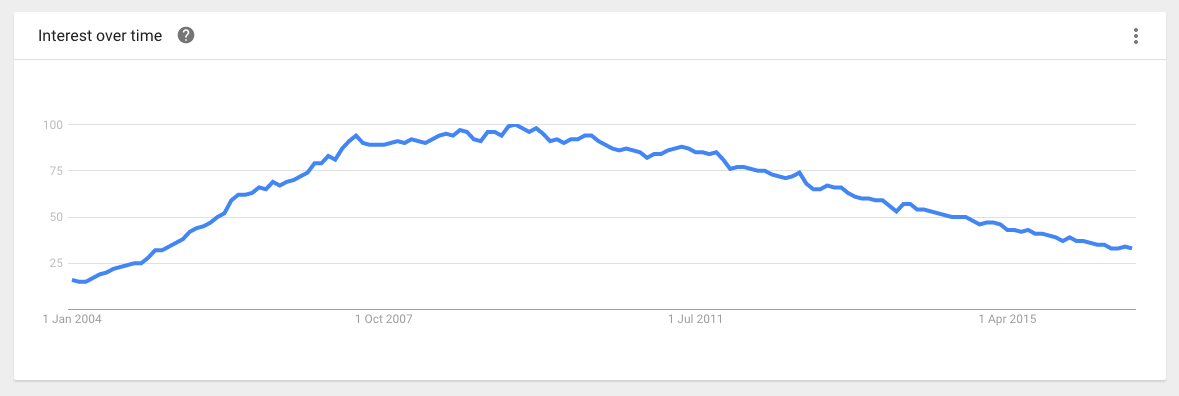Why social media isn't blogging.

I’m teaching first year journalism students at the moment and talking to them about a professional online presence. A phrase that I’ve been using a lot is blogging. The idea of a ‘blog’ and its value to an aspiring journalists is one I’m really comfortable with but I checked myself and wondered just what it might mean to the students.
As part of that, I had a look at Google Trends to see how the term blog was fairing. As I noted on Twitter:
Talking to the students today about why a 'blog' might be a good idea...looking at searches for blog and it makes me a bit sad pic.twitter.com/1HKYKOi1hu
— Andy Dickinson (@digidickinson) October 20, 2016
If you read all of this post, the irony that I put this on Twitter before I wrote this post — before I blogged it — will not be lost. As many pointed out in the conversation around the tweet, by putting it on Twitter I was blogging. Maybe its the terminology that’s changed.
Maybe, just like say 'clamshell phone', the term 'blog' had a short lifespan and has morphed into something else?
— Michal Dzierza (@michald) October 20, 2016
But for me there is something more about the idea of blogging; something more about what that term means.
There is a very mechanical element to the idea of a blog. At their heart is a mechanism by which anyone (with little more than the time to google your way through the set-up process) can set up a dedicated publishing platform for their content and share with people — the press tools Jay Rosen talked about. In this context, it’s easy to see how the idea of blogs can be subsumed into contemporary platforms and practice. Twitter and other Social media platforms do the same thing. Don’t they?
Blogger has also become a proper noun (beyond the google platform*). It’s a job title. It must be a proper job because we now differentiate between types of blogger — celebrity bloggers, fashion bloggers (its a kind of differential journalism). And to be frank, the amount of money many of them earn certainly qualifies it as ‘a living’
But, and I realise this is where I make this quite parochial and personal, in the journalism sphere, blogging has always meant more to me than simply the process.
Blogging as critical practice.
As digital disrupts, those in the industry who innovate, explore or just honestly talk about the challenges of the day-to-day, are pushed apart. Connections are lost. So the value of social media to hold together and sustain the communities of practice is immeasurable. But social media is prone to echo chambers and its hard for new voices to break in and disrupt the same old conversations. More fundamentally, social media has no collective memory. The mistakes, learning and context are lost in the stream of news. The echo chamber reverberates to a constant churn of the same questions popping up again and again.
Blogging, for me, was a way of setting that down — the collective wisdom of a community. A way for the community to archive its learning and insights. But more than that it was a way for us to share the working out not just the result — It was and continues to be a way for me to test my thoughts.
It also has been one of the key activities that has driven me to get enough profile that you’re reading this at all. It’s allowed me to build a presence alongside the chatter of social media. Something that underpins my transitory interactions with something more substantial (but maybe no less sensible!). An opportunity that is still there for aspiring journalists to grasp and exploit.
There isn’t the time, space or traction for that level of depth or reflection on social media.
So, as much as blogging may be becoming a bit of a legacy term, I still hold to my thought that “a blog is about the space to say why you think something in a world of people saying ***what ***they think in 140 chars or less.”
For me blogging was and still is a critical and thoughtful process.
*Just having to clarify that says something about the collective memory of social media)
